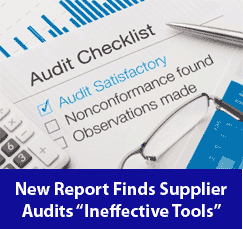Supplier audits have become a cornerstone of Corporate Social Responsibility (CSR) programs across the globe, used by dozens of retailers.
The audits are generally conducted based on a given company's formal written standards for supplier conduct, and generally show a high and often improving level of supplier compliance to those standards.
Supply Chain Digest Says... |
 |
Nike stated in its 2012 sustainability report that "We have learned that monitoring does not bring about sustainable change. Often, it only reinforces a pattern of hiding problems."
|
 |
|
|
But are such audit programs largely a charade in terms of actual effectiveness in affecting supplier behavior?
The surprising answer is Yes, according to a new report on the topic from the University of Sheffield in the UK, which says that "Ultimately, the audit regime is working for corporations, but failing workers and the planet."
The report is based on 25 interviews authors Genevieve LeBaron and Jane Lister conducted with ethical auditors, business executives, NGOs [non-governmental organizations] and supplier firms in North America, the United Kingdom and China, as well as visits to factories in China.
Visit the Retail Vendor Performance Management home page to learn more
and subscribe to the monthly newsletter.
The report notes that various NGOs have developed standards in their areas of expertise for supply chain behavior that are then often adopted as part of a given corporation's supplier standards. Examples include the Rainforest Alliance certification, Marine Stewardship Councils, and Fair Labor programs.
 In fact, the rise of these NGO standards and audit programs by corporations has had the effect of causing local governments at all levels in many countries to step back from creating and enforcing their own legal standards in such areas as rules relative to employee pay, conditions and more. In fact, the rise of these NGO standards and audit programs by corporations has had the effect of causing local governments at all levels in many countries to step back from creating and enforcing their own legal standards in such areas as rules relative to employee pay, conditions and more.
One of the persons interviewed for the report said that “Walmart, on behalf of the entire retail industry, said, 'this is our problem. This isn't a government regulatory problem. This isn't China's problem, this isn't Vietnam's problem. This is our problem. We have the power, resources, and ability to deal with it and we will.'"
The report notes that Nike stated in its 2012 sustainability report that "We have learned that monitoring does not bring about sustainable change. Often, it only reinforces a pattern of hiding problems."
Most audits, the report notes, are pre-announced, enabling producers to falsify records and rid facilities of unauthorized agency contractors or exploited workers during audits, and to drill their people on what they need to say.
Another big issue, the report says, is that supplier audits tend to concentrate on tier 1 suppliers, whereas most of the issues with the environment and treatment of labor are in tier 2 or 3 suppliers.
The reports says its interviews also highlighted the existence of a "checklist" mentality for audit compliance, with a director of a UK audit firm telling the authors that the majority of audits are "not trying to find things out, they're trying to prove that something is not there."
In support of their arguments, the authors cite several example of where there were major accidents at supplier sites that had recently passed the audit process. For example, in Bangladesh in 2012 the Tazreen Fashion factory was audited on behalf of Walmart. Safety concerns were noted, but it was not recommended that the plant be closed. Two months later, the factory burned down, killing over 100 people.
The report also finds that audits typically treat social concerns separately from environmental concerns, often putting greater emphasis on the latter.
Alas, the report really offers no real recommendations for improving the audit process, though it does imply changes such as more local governmental enforcement of labor laws and use of third party auditors instead of corporate employees would deliver better results.
Any comment on this article? Enter below.
Your Comments/Feedback
|